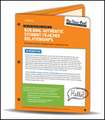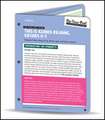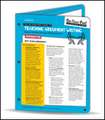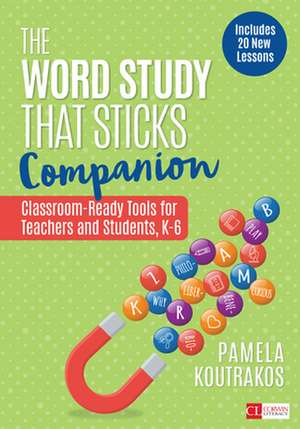The Word Study That Sticks Companion: Classroom-Ready Tools for Teachers and Students, Grades K-6: Corwin Literacy
Autor Pamela A. Koutrakosen Limba Engleză Electronic book text – 11 iun 2019
Pamela Koutrakos offers a plethora of tools and ready-to-go resources to help teachers put the inquiry-based structures, lessons, and routines she delivered in her first book,Word Study That Sticks, into action. Loaded with teacher-facing resources such as planning and assessment tools, and student-facing tools such as reproducible minicharts, choice checklists, and self-assessments,The Word Study That Sticks Companionincludes routines and materials that can be used withinanyword study curriculum. Let students take charge of their learning while you gain time for differentiated instruction, and make word study fun for students!
Din seria Corwin Literacy
-
 Preț: 285.18 lei
Preț: 285.18 lei -
 Preț: 158.08 lei
Preț: 158.08 lei -
 Preț: 278.39 lei
Preț: 278.39 lei -
 Preț: 243.82 lei
Preț: 243.82 lei -
 Preț: 244.25 lei
Preț: 244.25 lei -
 Preț: 88.42 lei
Preț: 88.42 lei -
 Preț: 273.64 lei
Preț: 273.64 lei -
 Preț: 274.70 lei
Preț: 274.70 lei -
 Preț: 200.91 lei
Preț: 200.91 lei -
 Preț: 248.26 lei
Preț: 248.26 lei -
 Preț: 284.26 lei
Preț: 284.26 lei -
 Preț: 294.79 lei
Preț: 294.79 lei -
 Preț: 281.36 lei
Preț: 281.36 lei -
![Mindsets and Moves: Strategies That Help Readers Take Charge [Grades K-8]](https://i3.books-express.ro/bs/9781506314938/mindsets-and-moves.jpg) Preț: 156.17 lei
Preț: 156.17 lei -
 Preț: 283.27 lei
Preț: 283.27 lei -
 Preț: 88.42 lei
Preț: 88.42 lei -
 Preț: 281.94 lei
Preț: 281.94 lei -
 Preț: 248.26 lei
Preț: 248.26 lei -
 Preț: 278.64 lei
Preț: 278.64 lei -
 Preț: 267.50 lei
Preț: 267.50 lei -
 Preț: 237.15 lei
Preț: 237.15 lei -
 Preț: 270.76 lei
Preț: 270.76 lei -
![Comprehension [Grades K-12]: The Skill, Will, and Thrill of Reading](https://i3.books-express.ro/bs/9781071812839/comprehension-grades-k-12.jpg) Preț: 287.79 lei
Preț: 287.79 lei -
 Preț: 278.10 lei
Preț: 278.10 lei -
 Preț: 245.45 lei
Preț: 245.45 lei -
 Preț: 204.26 lei
Preț: 204.26 lei -
 Preț: 272.62 lei
Preț: 272.62 lei -
![Every Minute Matters [Grades K-5]: 40+ Activities for Literacy-Rich Classroom Transitions](https://i4.books-express.ro/bs/9781544382449/every-minute-matters-grades-k-5.jpg) Preț: 193.61 lei
Preț: 193.61 lei -
 Preț: 274.00 lei
Preț: 274.00 lei -
![Flash Feedback [Grades 6-12]: Responding to Student Writing Better and Faster – Without Burning Out](https://i4.books-express.ro/bs/9781544360492/flash-feedback-grades-6-12.jpg) Preț: 232.71 lei
Preț: 232.71 lei -
 Preț: 88.67 lei
Preț: 88.67 lei -
 Preț: 147.92 lei
Preț: 147.92 lei -
 Preț: 273.44 lei
Preț: 273.44 lei -
 Preț: 184.56 lei
Preț: 184.56 lei -
 Preț: 88.67 lei
Preț: 88.67 lei -
 Preț: 236.11 lei
Preț: 236.11 lei -
 Preț: 209.15 lei
Preț: 209.15 lei -
 Preț: 256.83 lei
Preț: 256.83 lei -
 Preț: 291.04 lei
Preț: 291.04 lei -
 Preț: 288.67 lei
Preț: 288.67 lei -
 Preț: 273.44 lei
Preț: 273.44 lei -
 Preț: 278.10 lei
Preț: 278.10 lei -
 Preț: 174.52 lei
Preț: 174.52 lei -
 Preț: 244.44 lei
Preț: 244.44 lei -
![Mentor Texts That Multitask [Grades K-8]: A Less-Is-More Approach to Integrated Literacy Instruction](https://i3.books-express.ro/bs/9781071836132/mentor-texts-that-multitask-grades-k-8.jpg) Preț: 241.23 lei
Preț: 241.23 lei -
 Preț: 140.61 lei
Preț: 140.61 lei -
 Preț: 216.22 lei
Preț: 216.22 lei -
 Preț: 218.84 lei
Preț: 218.84 lei -
 Preț: 277.50 lei
Preț: 277.50 lei -
 Preț: 273.44 lei
Preț: 273.44 lei
Preț: 193.23 lei
Nou
Puncte Express: 290
Preț estimativ în valută:
32.63€ • 34.15$ • 27.15£
32.63€ • 34.15$ • 27.15£
Indisponibil temporar
Doresc să fiu notificat când acest titlu va fi disponibil:
Se trimite...
Preluare comenzi: 021 569.72.76
Specificații
ISBN-13: 9781544375052
ISBN-10: 1544375050
Pagini: 304
Dimensiuni: 203 x 254 mm
Ediția:1
Editura: SAGE Publications
Colecția Corwin
Seria Corwin Literacy
Locul publicării:Thousand Oaks, United States
ISBN-10: 1544375050
Pagini: 304
Dimensiuni: 203 x 254 mm
Ediția:1
Editura: SAGE Publications
Colecția Corwin
Seria Corwin Literacy
Locul publicării:Thousand Oaks, United States
Cuprins
Acknowledgments
Introduction
PART I: LAUNCHING CURIOUS, CREATIVE WORD STUDY
CHAPTER ONE: Building Vision for Word Learning
Teaching and Tools Make for a Purposeful Partnership
Multifaceted Word Study
Organizing Our Time: Creating a Cycle of Word Learning
Minichart Essentials
Getting Started: A Successful Launch for a Year of Word Learning
Building Repertoire: Active and Engaged Word Learning All Year
Checking In: Noticing Growth and Maintaining Progress
How to Navigate This Book
CHAPTER TWO: Visual Tour of a Word Study Notebook and Kindergarten Choice Chart
Word Study Notebooks
Balanced Use of Technology: Thinking Through the When and Why of Digital Notebooks
Kindergarten Choice Charts
CHAPTER THREE: Resources to Lighten the Load
Creating Inviting Learning Spaces
Setting Up Schedules That Encourage Independence
What Words Will We Use? Matching Students to Words
Using Assessment Information to Build Upon Class Strengths
Using Assessment Information to Build Upon Small-Group Strengths
Using Assessment Information to Build Upon Individual Strengths
Student Action Plan
Responsive Instruction and Feedback Support Success
Fostering Independence
Goal-Setting Templates (Primary)
Goal-Setting Templates (Upper-Elementary and Middle Grades)
Reflection Protocol Templates (Kindergarten)
Reflection Protocol Template (Primary)
Reflection Protocol Template (Upper-Elementary Grades)
PART II: TOOLS TO FOSTER ENGAGEMENT AND INDEPENDENCE
CHAPTER FOUR: Meaning Routines
Why Is Meaning Work Important?
How Does Meaning Work Fit a Range of Learners?
When Do Learners Engage in Meaning Work?
Primary-Grade Minicharts for Meaning Routines
Upper-Elementary Grade Minicharts for Meaning Routines
CHAPTER FIVE: Phonemic Awareness and Phonics Routines
Why Is This Phonemic Awareness and Phonics Work Important?
How Does Phonemic Awareness and Phonics Work Fit a Range of Learners?
When Do Learners Engage in Phonemic Awareness and Phonics Work?
Primary-Grade Minicharts for Phonemic Awareness and Phonics Routines
Upper-Elementary Grade Minicharts for Phonemic Awareness and Phonics Routines
CHAPTER SIX: Spelling Pattern Routines
Why Is Spelling Pattern Work Important?
How Does Spelling Pattern Work Fit a Range of Learners?
When Do Learners Engage in Spelling Pattern Work?
Primary-Grade Minicharts for Spelling Pattern Routines
Upper-Elementary Grade Minicharts for Spelling Pattern Routines
CHAPTER SEVEN: Habit and Hybrid Routines
Why Are Habit and Hybrid Word Work Routines Important?
How Do Habit and Hybrid Word Work Fit a Range of Learners?
When Do Learners Engage in Habit and Hybrid Word Work?
Primary-Grade Minicharts for Habit and Hybrid Routines
Upper-Elementary Grade Minicharts for Habit and Hybrid Routines
CHAPTER EIGHT: Check-In and Assessment Routines
Why Are Check-In and Assessment Routines Important?
How Do Check-In and Assessment Routines Fit a Range of Learners?
When Do Learners Engage in Check-In and Assessment Routines?
Primary-Grade Minicharts for Check-In and Transfer Routines
Upper-Elementary Grade Minicharts for Check-In and Transfer Routines
PART III: EXTENDING WORD LEARNING
CHAPTER NINE: Connecting With Caregivers
We’re Better Together: Tools to Reinforce Home-School Partnership
A Brief Word on Homework
After-Hours Activities Letters
Student-Caregiver-Teacher Communication Tools
CHAPTER TEN: Bonus Lessons to Bolster Word Study Engagement and Success
Bonus Meaning Lessons
Bonus Phonemic Awareness and Phonics Lessons
Bonus Spelling Pattern Lessons
Bonus Hybrid Lessons
Conclusion: Teacher Talk: Tales From the Classroom
Appendix
Appendix A: Frequently Asked Questions—and Answer
Appendix B: If/Then Chart for Matching Students to Patterns and Words
Appendix C: Word Study Routines at a Glance
Appendix D: Word Study Routines and Resources
References
Index
Introduction
PART I: LAUNCHING CURIOUS, CREATIVE WORD STUDY
CHAPTER ONE: Building Vision for Word Learning
Teaching and Tools Make for a Purposeful Partnership
Multifaceted Word Study
Organizing Our Time: Creating a Cycle of Word Learning
Minichart Essentials
Getting Started: A Successful Launch for a Year of Word Learning
Building Repertoire: Active and Engaged Word Learning All Year
Checking In: Noticing Growth and Maintaining Progress
How to Navigate This Book
CHAPTER TWO: Visual Tour of a Word Study Notebook and Kindergarten Choice Chart
Word Study Notebooks
Balanced Use of Technology: Thinking Through the When and Why of Digital Notebooks
Kindergarten Choice Charts
CHAPTER THREE: Resources to Lighten the Load
Creating Inviting Learning Spaces
Setting Up Schedules That Encourage Independence
What Words Will We Use? Matching Students to Words
Using Assessment Information to Build Upon Class Strengths
Using Assessment Information to Build Upon Small-Group Strengths
Using Assessment Information to Build Upon Individual Strengths
Student Action Plan
Responsive Instruction and Feedback Support Success
Fostering Independence
Goal-Setting Templates (Primary)
Goal-Setting Templates (Upper-Elementary and Middle Grades)
Reflection Protocol Templates (Kindergarten)
Reflection Protocol Template (Primary)
Reflection Protocol Template (Upper-Elementary Grades)
PART II: TOOLS TO FOSTER ENGAGEMENT AND INDEPENDENCE
CHAPTER FOUR: Meaning Routines
Why Is Meaning Work Important?
How Does Meaning Work Fit a Range of Learners?
When Do Learners Engage in Meaning Work?
Primary-Grade Minicharts for Meaning Routines
Upper-Elementary Grade Minicharts for Meaning Routines
CHAPTER FIVE: Phonemic Awareness and Phonics Routines
Why Is This Phonemic Awareness and Phonics Work Important?
How Does Phonemic Awareness and Phonics Work Fit a Range of Learners?
When Do Learners Engage in Phonemic Awareness and Phonics Work?
Primary-Grade Minicharts for Phonemic Awareness and Phonics Routines
Upper-Elementary Grade Minicharts for Phonemic Awareness and Phonics Routines
CHAPTER SIX: Spelling Pattern Routines
Why Is Spelling Pattern Work Important?
How Does Spelling Pattern Work Fit a Range of Learners?
When Do Learners Engage in Spelling Pattern Work?
Primary-Grade Minicharts for Spelling Pattern Routines
Upper-Elementary Grade Minicharts for Spelling Pattern Routines
CHAPTER SEVEN: Habit and Hybrid Routines
Why Are Habit and Hybrid Word Work Routines Important?
How Do Habit and Hybrid Word Work Fit a Range of Learners?
When Do Learners Engage in Habit and Hybrid Word Work?
Primary-Grade Minicharts for Habit and Hybrid Routines
Upper-Elementary Grade Minicharts for Habit and Hybrid Routines
CHAPTER EIGHT: Check-In and Assessment Routines
Why Are Check-In and Assessment Routines Important?
How Do Check-In and Assessment Routines Fit a Range of Learners?
When Do Learners Engage in Check-In and Assessment Routines?
Primary-Grade Minicharts for Check-In and Transfer Routines
Upper-Elementary Grade Minicharts for Check-In and Transfer Routines
PART III: EXTENDING WORD LEARNING
CHAPTER NINE: Connecting With Caregivers
We’re Better Together: Tools to Reinforce Home-School Partnership
A Brief Word on Homework
After-Hours Activities Letters
Student-Caregiver-Teacher Communication Tools
CHAPTER TEN: Bonus Lessons to Bolster Word Study Engagement and Success
Bonus Meaning Lessons
Bonus Phonemic Awareness and Phonics Lessons
Bonus Spelling Pattern Lessons
Bonus Hybrid Lessons
Conclusion: Teacher Talk: Tales From the Classroom
Appendix
Appendix A: Frequently Asked Questions—and Answer
Appendix B: If/Then Chart for Matching Students to Patterns and Words
Appendix C: Word Study Routines at a Glance
Appendix D: Word Study Routines and Resources
References
Index
Descriere
Kickstart
joyful
independent
word
study
practice
in
your
K–6
classroom
Pamela Koutrakos offers a plethora of tools and ready-to-go resources to help teachers put the inquiry-based structures, lessons, and routines she delivered in her first book,Word Study That Sticks, into action. Loaded with teacher-facing resources such as planning and assessment tools, and student-facing tools such as reproducible minicharts, choice checklists, and self-assessments,The Word Study That Sticks Companionincludes routines and materials that can be used withinanyword study curriculum. Let students take charge of their learning while you gain time for differentiated instruction, and make word study fun for students!
Pamela Koutrakos offers a plethora of tools and ready-to-go resources to help teachers put the inquiry-based structures, lessons, and routines she delivered in her first book,Word Study That Sticks, into action. Loaded with teacher-facing resources such as planning and assessment tools, and student-facing tools such as reproducible minicharts, choice checklists, and self-assessments,The Word Study That Sticks Companionincludes routines and materials that can be used withinanyword study curriculum. Let students take charge of their learning while you gain time for differentiated instruction, and make word study fun for students!
